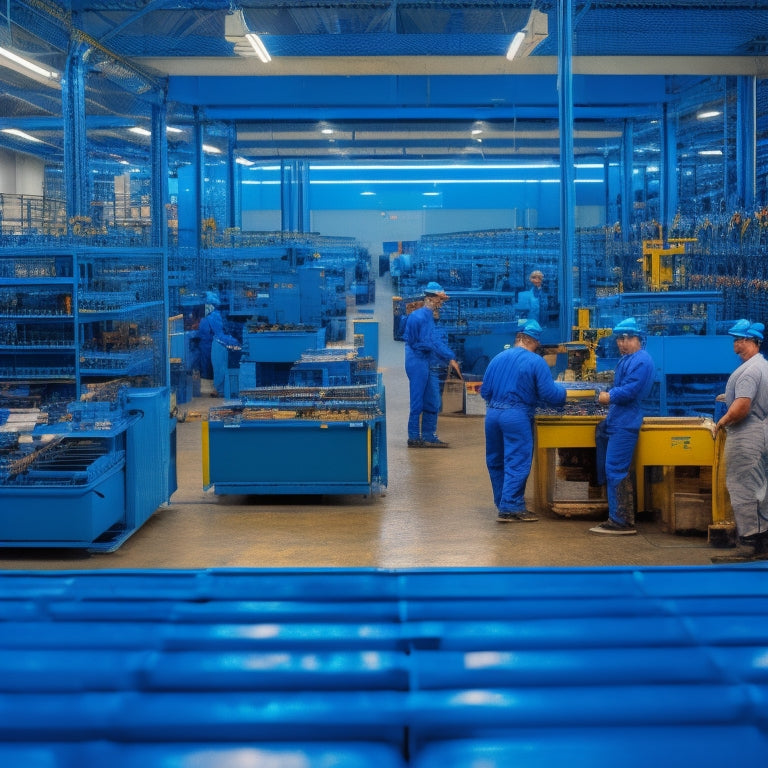
Domestic Manufacturing Rules Boost EV Industry Prospects
Share
Clear domestic manufacturing rules and eligibility requirements are essential for boosting the prospects of the electric vehicle (EV) industry in North America. By setting standards for battery components and critical minerals, these rules drive economic growth, national security, and job creation. Encouraging domestic production of critical minerals and battery components reduces reliance on international supply chains. As the industry continues to evolve, understanding the nuances of domestic manufacturing rules will be critical for companies seeking to thrive in the EV market, and grasping the full implications of these regulations will be indispensable for unlocking the industry's full potential.
Key Takeaways
• Domestic manufacturing rules enhance the EV industry's prospects by driving economic growth and national security through increased job opportunities and reduced dependence on foreign suppliers.
• Clear targets for production in North America ensure a stable and sustainable supply chain, meeting eligibility requirements for domestic manufacturing and final assembly of electric vehicles.
• Innovative critical mineral processing, recycling, and alternative technologies are crucial for building supply chain capacity and reducing environmental impact.
• Significant investments in domestic electric vehicle manufacturing, such as Honda's and Toyota's new battery plants, demonstrate progress in establishing a robust domestic supply chain.
• Tax credits, like the federal tax credit of up to $7,500 per vehicle, play a pivotal role in driving EV market growth and meeting emission targets.
Eligibility Requirements for EV Industry
Specific eligibility requirements for domestic manufacturing, including final assembly of electric vehicles in North America, standards for battery components and critical minerals, and specific targets for production in North America, will shape the EV industry's prospects.
The assembly location of electric vehicles plays an important role in meeting these requirements, with a focus on North American production.
Battery standards, including those for components and critical minerals, are also vital for eligibility.
By setting clear targets for production in North America, the industry can secure a stable and sustainable supply chain.
These requirements will not only boost the EV industry's prospects but also drive economic growth and national security.
Driving Economic Growth and Security
By meeting domestic manufacturing requirements, the EV industry can generate significant economic benefits, including job growth, increased GDP, and enhanced national security through reduced dependence on foreign suppliers. This, in turn, contributes to economic stability and strengthens national defense. The industry's growth potential is substantial, with far-reaching implications for the economy and national security.
Here are some key aspects of the EV industry's economic impact:
-
Job creation: Domestic manufacturing can lead to a significant increase in employment opportunities, stimulating local economies.
-
Economic growth: Increased production and sales of EVs can contribute to GDP growth, boosting the overall economy.
-
National security: Reduced dependence on foreign suppliers enhances national security by minimizing reliance on potentially unstable or unfriendly nations.
- Diversified supply chains: Encouraging domestic production of critical minerals and battery components reduces reliance on international supply chains, enhancing economic stability and national defense.
Building Supply Chain Capacity
Enhancing supply chain capacity through innovative critical mineral processing, recycling, and alternative technologies is essential for achieving domestic manufacturing eligibility and reducing dependence on foreign suppliers.
The development of greener mining practices is pivotal in this endeavor, as it will not only reduce environmental impact but also increase the efficiency of mineral extraction.
Innovation in processing is also essential, as it enables the production of high-quality battery components while minimizing waste and energy consumption.
Policies supporting these initiatives, such as the Energy Act of 2020 and Bipartisan Infrastructure Law, are driving progress in building supply chain capacity.
Progress in Domestic EV Manufacturing
Domestic electric vehicle manufacturing has witnessed significant investments and projects, including the Thacker Pass Lithium Mine in Nevada, which showcases the industry's progress in establishing a robust domestic supply chain. This growth is driven by investment opportunities in green technology advancements, paving the way for a more sustainable future.
Some notable developments in domestic EV manufacturing include:
-
Honda's investment in battery manufacturing, strengthening its commitment to electrification.
-
LG Energy's expansion of battery production, catering to the rising demand for EVs.
-
Toyota's plans for a new battery plant, solidifying its position in the EV market.
- Innovative mining initiatives, focusing on greener practices and reducing environmental impact.
These advancements demonstrate the industry's progress in domestic manufacturing, fostering a more self-sufficient EV ecosystem.
Incentivizing EV Adoption and Growth
The role of tax credits in incentivizing electric vehicle (EV) purchases has been pivotal in driving the growth of the EV market. The current federal tax credit of up to $7,500 per vehicle plays an essential role in meeting emission targets.
EV incentives have been instrumental in encouraging widespread adoption, contributing greatly to market expansion. As the industry continues to evolve, it is important to reassess and refine these incentives to make sure they remain effective in promoting sustainable transportation.
Frequently Asked Questions
Can Foreign Companies Partner With US Firms to Meet IRA Standards?
Like two pieces of a puzzle fitting together, foreign companies can partner with US firms to meet IRA standards, leveraging joint ventures to share resources, expertise, and risk, thereby accessing partnership benefits and accelerating domestic EV manufacturing growth.
Will Domestic Manufacturing Rules Apply to All EV Models or Only New Ones?
The domestic manufacturing rules will likely apply to new EV models, with retrofit incentives for existing inventory, and a phased implementation timeline to accommodate production timelines, ensuring a smooth handover for manufacturers.
How Will the IRA Address Concerns Around Mineral Sourcing and Mining Practices?
The IRA addresses mineral sourcing and mining concerns through enhanced supply chain transparency and environmental accountability, ensuring responsible sourcing and reducing the environmental footprint of EV production.
Are There Plans to Standardize EV Charging Infrastructure Across the Us?
As the EV revolution sparks to life, plans are underway to standardize EV charging infrastructure across the US, prioritizing universal access and charging hubs, ensuring seamless travel and alleviating range anxiety for the burgeoning EV community.
Will the IRA Lead to Higher EV Prices Due to Increased Manufacturing Costs?
The IRA's domestic manufacturing requirements may lead to a cost burden on EV manufacturers, potentially resulting in price hikes, as companies absorb increased costs of complying with standards for battery components and critical minerals.
Related Posts
-

Smart Energy: Greener Homes With Connected Power Devices
You can control and optimize your energy consumption with smart energy devices, reducing your carbon footprint by up ...
-

What Water-Saving Gardens Complement Electric Vehicle Ownership?
As you pair your electric vehicle with a water-saving garden, you're not only reducing your carbon footprint but also...
-

10 Powerful Electric Mowers for Expansive Lawns
You're moving away from gas-powered mowers and exploring electric options for your expansive lawn. You'll find that h...


